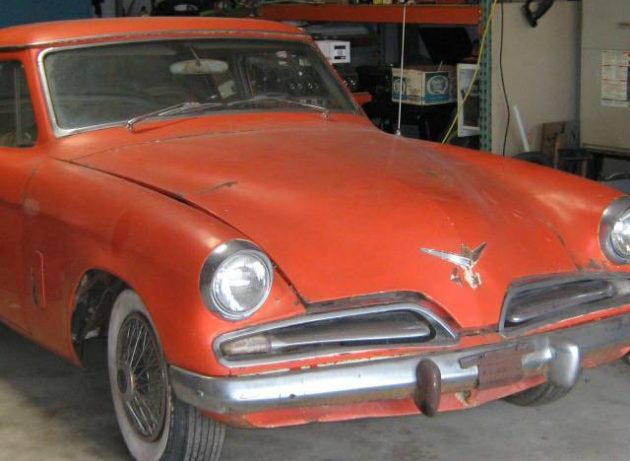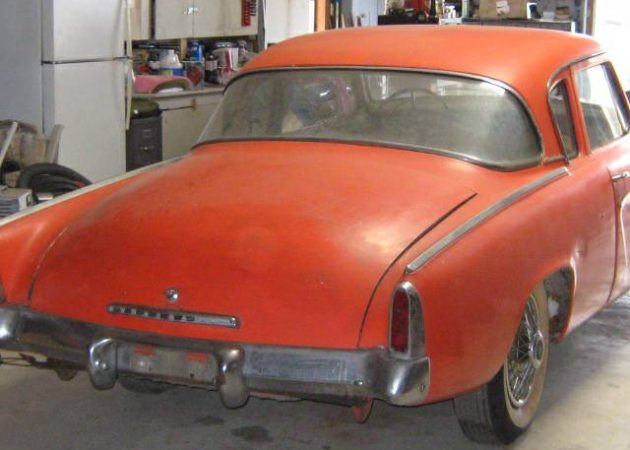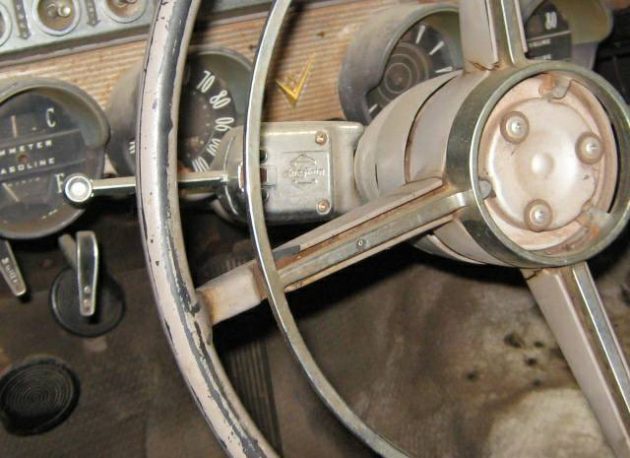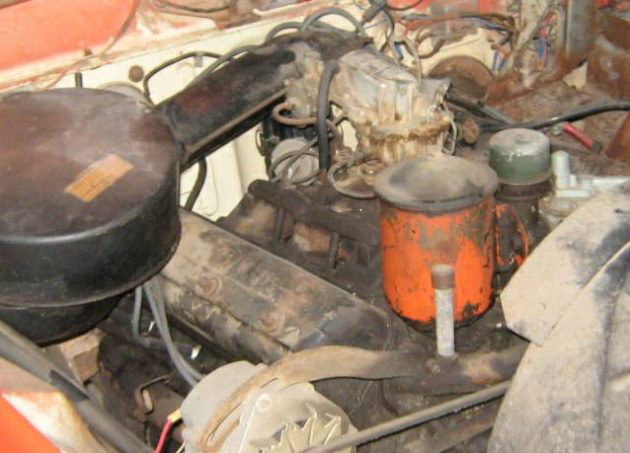Command the Road: 1953 Studebaker Commander
Once or twice a decade it seems Studebaker was able to knock a home run out of the park. Bullet-nose Stude’s, Avanti’s, Presidents, and Larks all wowed car buyers when they were introduced, then were allowed to whither on the vine. 1953 was the first year for the South Bend beauties and 1964 would see the end for the overall design. Find this sleek stunner here on Craigslist in Pittsburg, KS for $6500.
Designer Raymond Loewy set out in the early 50s to wow the critics and improve Studebakers image with a shape not seen before in the USA. The design for 1953 was stunning, with long and low European influences and less chrome to show off the shape. This example might not be a hardtop, but it still has all the right moves. How can you go wrong with two doors, three-speed manual, and a 232 V8? And this was meant to be a family car!
Correct me if I am wrong, but I believe this is a Commander Starlight coupe, though the identifying badges aren’t present. The styling on that long 120″ wheelbase might have been a knock out, but the build quality took a blow to Studebaker’s reputation. Rushed into production, the 1953 Studebakers, and especially the coupes, were known for chassis flex, doors opening while driving, bent frame rails, rattles, and rust. People love a beautiful design, but they cherish a long lasting, reliable car more. Probably why we have Toyota today and not Stude.
This example shows quite of bit of rust in the trunk, fenders, and under the hood. The car appears to have originally been white and now sports a reddish orange re-spray that could use a redo. There are some small dents but overall the car appears to be fairly straight. The tired interior looks to have been redone in a dark tan vinyl, with the front seat worn through on the drivers side, and the matching headliner appears to be coming down as well. That rear center armrest and ashtray is something you only see today on luxury cars, sans ashtray. Will J.C. Whitney wire wheel hubcaps ever become desirable?! Said to run, is this 1953 Studebaker Commander worth restoring, or is it a better candidate for street rodding? What would you do it with it? And what car for 1953 do you feel had the best styling?
Auctions Ending Soon
 1969 Ford MustangBid Now12 hours$1,050
1969 Ford MustangBid Now12 hours$1,050
 1965 Ford Falcon Station WagonBid Now3 days$2,300
1965 Ford Falcon Station WagonBid Now3 days$2,300
 2002 Jaguar XK8 ConvertibleBid Now4 days$4,250
2002 Jaguar XK8 ConvertibleBid Now4 days$4,250
 1979 Chevrolet Camaro Z/28Bid Now5 days$4,500
1979 Chevrolet Camaro Z/28Bid Now5 days$4,500
 1960 Dodge D300Bid Now5 days$300
1960 Dodge D300Bid Now5 days$300





Comments
Looks as if there is an aftermarket turn signal switch. Could this have been an option in 1953?. This one has the very typical rust around the front fender vents.
In 1962, when this basic car had been restyled once again to become the GT, I could not understand why my Father did not consider buying one. He chose a 1962 Pontiac Catalina Convertible; with my pestering, of course. It was a good choice.
When I was young, growing up on the farm and hiring out for doing hay work during the summer there was a farmer that had one very similar to this one parked back in the grove. Didn’t run, don’t know why but it sat there for a number of years till eventually it was sold to a scrapper.
I loved the looks of the car and with the right drivetrain I figured it would be a blast.
Give a supercharged Avant engine, or 289 Ford, 327 Chevy and 4 speed. Lots of fun.
i bought one sitting on Greenville avenue for $40. in 1968…in dallas..no rust…pulled flathead 6 and 3 speed bought a DeSoto Firedome Hemi and Powerflite for $40 and a set of HUrst mounts from Hot Rod Exchange on the trinity for $25 and put it together on a vacant lot…the Hemi idled like garbage cans rolling down a flight of stairs…..Great Car!!!
+Bradshaw from Primer – wonder where it is now? Your experience IS hot rodding. Thumbs up.
Now yore tawlkin’. If the engine doesn’t rattle windows at idle, it’s not much of an engine (before VVT, ECUs, EECs, etc.). If I only had a Stude to put my 291 De Soto Firedome into. With the Road Chicken 4 speed.
Somewhere out there in dreamland…..along with the RX-2, Lotus ELan, Ferrari 250 GT cabrio ($3,000 in great shape) and all the other wonderful dream cars in Dallas 1968-1978…..XK-SS ($3,000) had a SBC in it owned by DORAN chev…they let R&T test it in 57……Beach FVee…$1200…..with trailer ….
now honda fit, 97 Paseo, 87 Sportsmoble.
nowadays….97 vette…180 mph 29 mpg….hahahahaha amazing.
$7800!!! still a great place for great cars!!!
Got a photo of me somewhere at age 17 sanding on a ’53 two door HT. Like most teenagers I never got past the primer phase and regretfully sold it.
+Fred w. – We’d sure love to see it.
Designed by Robert Lowey, one of the only automotive designs to receive an award of excellence for design from the Metropolitan Museum of Art in New York. Judging by the firewall, this one looks like the Retardo Red paint was added sometime later in it’s life, which is an unfortunate choice for this classic. But what are ya gonna do? Some people could screw up a baked potato.
Raymond Loewy.
It’s Raymond not Robert ya banana.
Had one and put a 50s caddy engine and trans in it What a blast The Starlighter referenced the 2 door hardtop without the post near as I can remember (at 75).
Owned a 54 but had to go wrecking yard and all they had was a 54 title; I took it, got car registered, rebuilt motor with pop up pistons with overbore to 304 cubes, carb, reground cam solid lifters, Offy MANIFOLD and Carter AFB, and promptly broke original and two other rear axels.
Surprisingly fast 1/4 with shortened 8 3/ Dart 371 posi, and with tires and adjustable shocks handled old two lane twisty roads.
Yellow with a purple nauga interior,; I beat MOPAR in that I had 2 4″wide stripes over rear and painted Yellow Jacket badge.
Very collectible today as Studes have a huge cult following.
Rust was always a problem, as were the damn skinny axle shafts, and engine bays will hold everything from stock to any GM motor.
Many of these coupes went under the old torch and lead it in customizers of past, and this looks like a creative minds uncut, unfaceted. jewel in the rough.
The rear axle was connected to each rear wheels with a single key instead of a spline shaft. I broke mine with the stock engine. Worse engineering mistake ever! I replaced my whole rear end with a 49 Ford rear axle and wheels. I couldn’t afford a Chevy posi-traction at that time (1964).
The original axles were made for bias ply tires and low power engines. Add more power and radial tires and you have a recipe for damage. Phil Harris, Fairborn Studebaker, http://fairbornstudebaker.com, made replacement flanged axles for Studebakers. Not sure if that is still available.
I owned a ’53 coupe in the UK many years ago. Had the 232 V8 with 3 on the tree and overdrive. Put a set of radials on her and she handled like a dream. Had road races around the English country roads with a Spitfire GT6 and other “boy racers”, great fun.
Me Bad, previousmy wrote I owned 54 but it had been untitled 53 with 54 title.
@MadBrit; ever use overdrive to hold car in place while waiting for light change at a real steep uphill intersection?
Just switch OD lever and auto would not roll backwards.
The overdrive did NOT hold the car back on a hill ! Studebaker had an optional Hill Holder device that used the hydraulic brake system to hold the car when stopped at an intersection that was up hill . You depressed the clutch pedal and pumped the brake pedal once and the brakes were fully applied and held the car in place until You released the clutch this would release the brakes and away You went . The overdrive was essentially an extra gear that was engaged electrically by a solenoid in the transmission after the vehicle reached about 25 mph or so it reduces engine RPMs like another gear would 😎
Hide Behind:
Be careful using this tactic. On all the Borg-Warner overdrives, there is a sprag clutch that prevents the output shaft from turning the opposite way when the Overdrive is engaged, because it’s not supposed to be in OD when the trans is in reverse.
problem is, if too much pressure is put on that sprag clutch the wrong way, it will expand and reverse the oval sprag rollers, cracking the O.D. case, and that cannot be repaired. You need a complete replacement overdrive at that point. It will also leave a big pool of transmission oil on the pavement!
I have a later Hawk with basically same body and chassis. Studebakers do draw a lot of attention, the one posted here looks scary rusty though, if interested better inspect it in person.
Imo Studebaker had some of the best styling of the early 50’s…My dream car is an all black ’56 Golden Hawk with a manual.
+Paperbkwriter – It is very rare to find one of those with the manual. You might have to attend some swap meets to find one. Good luck.
The manual is usually kept in the glove compartment.
This car is a Studebaker Commander with a V8 & Overdrive, but it’s not a Starlight, that name was reserved for the 2-door hardtop.
It’s my understanding that the Starlight was the two door post and the Starliner was the two door hardtop.
Corey is correct. In 53 and 54 they named the hardtops Starliners, and the B post coupes Starlights. Commanders had the V-8 and Champions had the straight 6. The coupes had the 120″ wheelbase. The sedans were a completely different frame, wheelbase, and different proportions. I own a 53 Commander Starliner Coupe and I’m in the process of restoring it. The major problem outside of typical rust is frame flexing. The 53 coupes were known for flexing to the point a door could fly open during a sharp turn where the frame was stressed enough. The 54 models added some additional support points at the door jambs. The flexing also resulted in some occasional frame cracking at certain joints. I haven’t heard of any significant suspension issues – the system is pretty straightforward. Parts for these cars are very readily available, including body parts. Many parts for the coupes are interchangeable from 1953 through the hawks in 1964.
Probably the most interesting thing is they were intended to have a new mechanical power steering system developed by Borg Warner. It was a complex set of clutches that allowed for variable steering tension. Although it was advertised in magazines, and appears in all the 1953 shop manuals, it was pulled at the very last minute, and no cars were ever sold with the system. They destroyed all the units, and as far as I know, none remain. There was never a clear reason why they pulled the units, although some said they were noisey, or too expensive to repair, but its hard to believe they would have been developed so far along with those issues.
OK.
I was told I could not do it, and then told to be carefully if I did.
Well I did it while Visiting Worlds Fair in Seattle Wa. And then when driving hills of Tacoma Wa. While dropping off old school chums.
Know it was not a good practice and never recommended it, only if done.
Worked on that auto from stem to stern rebuilding every mechanical part.
Then again being a believer in alternative universes, maybe I drove to F’n fast and ended up in this one.
Thought the Starlight was one of the bullet nose models, the one with the huge multi paneled wrap around rear window.
I like the looks of the turn signal. I can not tell the mfr. Would anyone care to help?
Actually designed by Bob Bourne who worked for Loewy!
Almost correct, his name was Bob Bourke.
These things SCREAM TO BE HOT RODS ! ! ! Weather it’s on the salt flats looking at 200mph or a 9sec 1/4 mile-this is it. I’ve been in love with these Studes for over a half century.
The hill holder was built into the brake and clutch assembly. There was a ball bearing in a slot that tilted with the clutch pedal and allowed one to pressure the brakes until the clutch was released.
The overdrive was a mechanical engaged unit which sometimes could be a pain as one had to be stopped to disengage it. If one was in slower moving traffic, it could toggle in and out of overdrive. To cure this, one turned the ignition key to the unused start position and this electronically disengaged the overdrive. To re-engage, one simply depressed the throttle pedal fully as if to kick-down out of overdrive. Some Jags also had a hill holder.
Mine not only did not use the key start position, but had a blank plug in the dash recess which was labelled “start”. When I bought the car, it was delivered to a friend’s garage and left for me, took me a few minutes to realize there was a second dip switch on the floor and a tab on the clutch pedal before I could get it running.
I was told these models also had such engineering luxuries as needle rollers in the kingpins.
This aerodynamic model is still in use on the Bonneville Salt Flats in land speed record attempts, also many fiberglass bodies were made and used on the drag strips.
My dad redone a 53 still have never seen it have body flex and doors open studebakers for most part were well build cars
I always liked this design and for all its flaws it would be worth saving as is, if for no other reason but the design.
This is one of my bucket list cars.
When we were in our teens, my brother and I wanted to enter a model-building contest.
My brother chose a 1902(?) Curved-Dash Oldsmobile. He built it with slicks, and small mag wheels in the front, and a reversed, blown Hemi behind the driver driving through a v-drive to a Dana-type rear.
I chose this car. A 1953(?) Commander. The kit included a blown Hemi (with 2 blowers on a V’d manifold, sticking out of the bulged hood). I upholstered the seats, and even made cloth seat belts.
My brother’s was the most imaginative, and was stolen during the show.
I’d like to have one of these as a mild pro-street driver. No automatics need apply.
Back when the new ’53 Stude debuted, they were in such high demand the factory couldn’t churn them out fast enough, because everybody liked the futuristic design, nothing else from the Big Three even came close. Park one next to a ’53 model of Ford, GM or Chrysler sedan and the first thing you’ll notice is the roofline of the Stude is at least a foot lower. And as was pointed out above, lots of ’53 Stude 2 doors were hot rodded, and the Pontiac V-8 was another popular transplant. One weakness with these cars that nobody mentioned was the front suspension frequently failed, not sure exactly what would break, but when I was a kid in the mid 60s, remember seeing numerous 53-55 Studes (2 doors not so much) in the local wrecking yards that had been drivers until whatever it was in the front end had failed.
There where 250 Studebakers alone at the Ron Hackenberger auction in Ohio last summer. Any model you can think of and lots of them were 100% rust free and they sold for less then this. Some were repainted and needed reassembly.